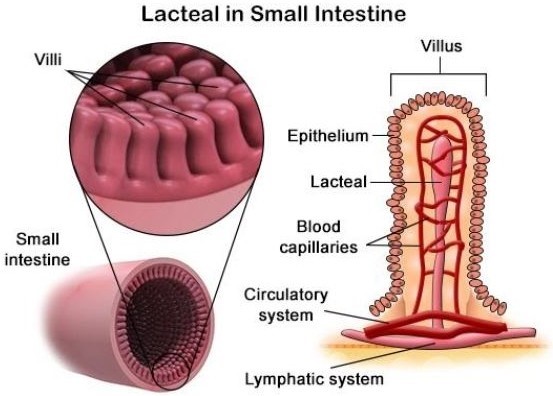Lipids absorbed in the small intestine will first enter which of the following structures?
Veins
Arteries
Lacteal vessels
Interstitial spaces
The Correct Answer is C
Lacteal vessels. Lipids absorbed in the small intestine will first enter lacteal vessels, which are small lymphatic vessels located in the villi of the small intestine. These vessels transport the absorbed lipids to the lymphatic system, where they eventually enter the bloodstream.
a. Veins and b. Arteries are blood vessels that transport blood throughout the body. Lipids absorbed in the small intestine do not directly enter these vessels.
d. Interstitial spaces are spaces between cells and tissues that contain interstitial fluid. Lipids absorbed in the small intestine do not directly enter these spaces.

Nursing Test Bank
Naxlex Comprehensive Predictor Exams
Related Questions
Correct Answer is A
Explanation
Perforins are immune system molecules that create holes in the cell membranes of their target cells in order to destroy the cell. Perforins are proteins that are released by cytotoxic T cells and natural killer cells.
They form pores in the target cell membrane, allowing water and ions to enter the cell and causing it to swell and burst.
The other options are not correct because they do not accurately describe the immune system molecules that create holes in the cell membranes of their target cells. Interferons, cytokines, and lymphotoxins do not create holes in cell membranes.

Correct Answer is D
Explanation
It was frozen in the cold temperature of the Alps shortly after death and remained frozen until it was found. Freezing can preserve a body by slowing down or stopping the decomposition process.
Whether you are a student looking to ace your exams or a practicing nurse seeking to enhance your expertise , our nursing education contents will empower you with the confidence and competence to make a difference in the lives of patients and become a respected leader in the healthcare field.
Visit Naxlex, invest in your future and unlock endless possibilities with our unparalleled nursing education contents today
Report Wrong Answer on the Current Question
Do you disagree with the answer? If yes, what is your expected answer? Explain.
Kindly be descriptive with the issue you are facing.
